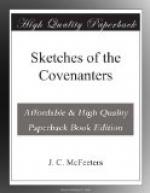The Presbyterian Church made great progress under the Covenant of 1581 and overspread the kingdom. After ten years of prosperity came another declension. Again she was reclaimed and revived by the renewing of the Covenant of 1596. Once more she became exceedingly prosperous and popular; but her popularity resulted in weakness. Multitudes “joined the Church” merely for place, privilege, and power. These soon made themselves felt on the wrong side: they controlled the courts of God’s House. Faithful ministers contended for the truth, resisted the innovations, protested in the name of Jesus, and suffered because they would not consent to do evil. They were overpowered and sometimes were displaced, sometimes imprisoned, sometimes banished. Their farewell sermons were heart-rending. Amid the sobs and wails of the affectionate people, the farewell exhortations came from these devoted men of God as words from heaven. Great excitement and sorrow prevailed in the churches, as the stricken congregations took leave of the pastors who loved the truth more than their own lives. Who can wonder at the indignation that arose like a storm, as the congregation witnessed their beloved pastor and his wife and children leave their home, and go forth to wander under the skies of summer or through the storms of winter, not knowing whither they were going! Should the people be censured for nailing the church doors against intruding ministers, and refusing to hear the hirelings sent to fill the pulpit against their will?
The Five Articles of Perth, adopted by those who were in power in the Church and enforced by Civil law, became the pastor’s test. The Presbyterian minister who would not approve of the Five Articles was deposed. But how could a Covenanter give his approval without perjury? The Five Articles of Perth were these:
Kneeling at the Communion;
Observance of Holidays;
Episcopal Confirmation;
Private Baptism;
Private Communion.
The first implied the worship of the bread; the second, the homage of saints; the third, the approval of Prelacy; the fourth, that baptism was necessary to salvation; and the fifth, that the communion opened heaven to the dying; all savored of Popery.
What minister having any regard for conscience could sign this list of errors, after swearing the Covenant? Would he not immediately feel his spiritual life sink below zero? Would not his heart chide him bitterly for the degradation of his office and manhood? And God is greater than the heart.
David Dickson was one of the ministers who had strength to endure, rather than bend. He was a young man full of fire and holy power. He had charge of a flourishing congregation at Irvine. His preaching swayed the people. They crowded the church to hear him. His appeals melted the heart and watered the cheeks. He was bold to denounce the Articles of Perth. The authorities called him up and commanded him to retract; he refused. A sad farewell to his flock followed. Rather than support error, however popular and profitable, he would sacrifice the dearest ties on earth and journey to parts unknown. And this he did.




